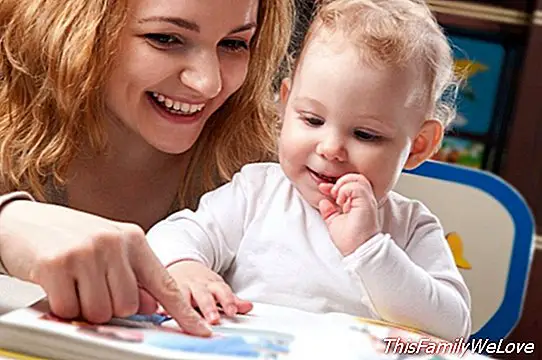8 tips to read your baby

It's never too early to start reading your baby. It does not matter if it's a book of stories or fables, or the policy column in the newspaper, the important thing is to read aloud to your baby and share time between parents and children.
From six to twelve months, babies begin to acquire their own tastes. It is very clear, for example, in food. During these months you can see how there are foods that seem to be very appetizing and others that refuse without thinking twice.
The same happens with books, characters and toys. At this age, children are already beginning to be able to sit on your lap, pick up books themselves and even show interest in picking up books and turning their pages. The use of cardboard books or thick pages are the best for these months, ideal to start reading your baby from the cradle.
The baby and his first contact with books and reading
From the first year to two years, children already have a sense of the use of books. They understand that it is not a toy to nibble on. They begin to interact with the books in an appropriate way, such as taking them in the right direction, turning the pages from beginning to end and observing the images with inquisition.
At these ages they are even responding to simple questions about the images in the book such as: "Where is the cat on this page? Can you find it?" Little by little, the children will begin to complete the end of the sentences read and later they will be able to recite the books that you read them.
Around two years old, children already have an established routine. You already know what hours you eat, at what time you will put them to sleep, etc. Also, if reading is something regular, they will also know when it is time to read and share time with their parents. Just like eating, you can not expect them to be immersed in the book for long, their ability to pay attention is still limited.
Tips to read your baby
1. Read to your child every day, even if it's only a couple of minutes. The important thing is that time, however brief, to share a moment of reading together.
2. Reading should be fun and not boring. Therefore, it is not necessary to finish the books in one sitting. We know that your attention is of short duration, so it does not make sense to finish the books when reading ceases to be a pleasant activity.
3. Allow your children to choose the book they want you to read. This can mean reading the same story a thousand times. While the little one enjoys the book and you are able to read it with a voice of interest, the novelty of the content is irrelevant.
4. Encourage your child to "read" him from a book with which he is familiar, or that you read to him frequently. It will most likely be a mixture of babbling and words, but it is a phenomenal cognitive exercise for the little one.
5. Be creative. Ask your child about the images or what he thinks will happen next in the story. Your motivation to be creative will undoubtedly produce some very nice answers.
6. Offer your child a variety of reading possibilities between books for children of his age, stories and fables, poetry and lullabies.
7. Try to follow the tastes of your children. There are many non-fiction books that can be very interesting to you, such as ocean books, space, animals, etc.
8. Reward the readers' triumphs of your children. Encourage them with praise when they finish the sentences in the memory books, or when they try hard to read you.
Mayte Balda




